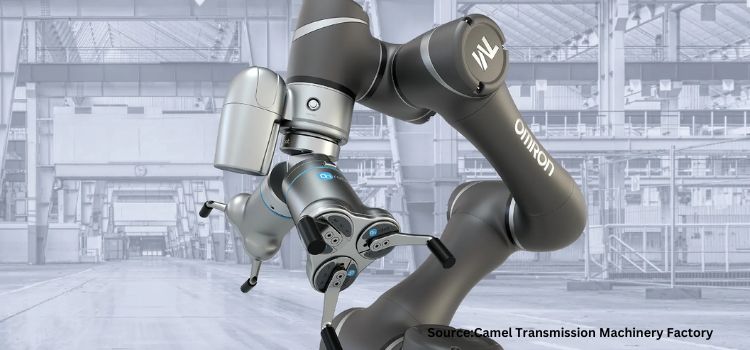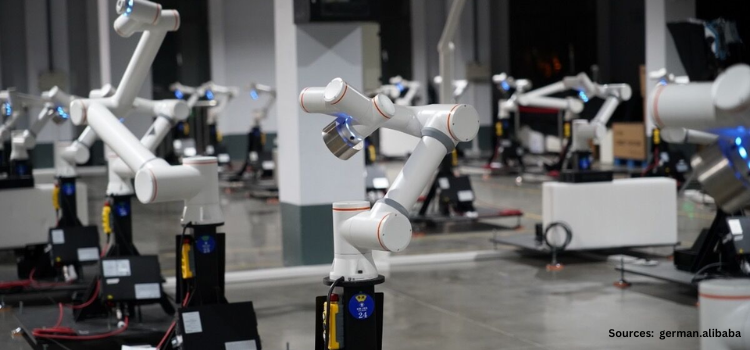
APAC Warehouse Robotics Market by Type (Automated Guided Vehicles (AGVs), Autonomous Mobile Robots (AMRs), Articulated Robots, & Others), by Offering (Hardware, Software, and Services), by Payload Capacity (Less than 100 KG, 101-200 KG, 201-500 KG, and Others), by Application (Palletizing and Depalletizing, Sorting and Packaging, Picking and Placing, Transportation), and by End-User (E-commerce, Automotive, Food & Beverages, and Others) – Opportunity Analysis and Industry Forecast, 2025–2030
Industry: Semiconductor & Electronics | Publish Date: 29-Mar-2025 | No of Pages: 214 | No. of Tables: 165 | No. of Figures: 110 | Format: PDF | Report Code : SE3139
APAC Warehouse Robotics Market Overview
The APAC Warehouse Robotics Market size was valued at USD 3.58 billion in 2024, and is predicted to reach USD 10.23 billion by 2030, at a CAGR of 18.1% from 2025 to 2030.In terms of volume, the market size was 195.18 thousand units in 2024 and is projected to reach 601.90 thousand units by 2030, with a CAGR of 19.5% from 2025 to 2030.
The warehouse robotics market in Asia-Pacific is witnessing constant rise, driven by the growing need for automation in industries such as e-commerce and increase in sales in automobiles and logistics. The robotics market is designed to maintain the flow of warehouse operation. As there an surge in e-commerce industry and sales in automobiles tends to excel the growth of the Warehouse Robotics Market. However, high costs involved in deploying warehouse robotics systems pose challenges to further growth.Addition of artificial intelligence in warehouse robotics creates future opportunity.
Growing E-Commerce Industry Drives the Demand for Warehouse Robotics
The rise in e-commerce across APAC, has boosted massively regarding the demand for more accurate logistics and warehouse operations. As a part of daily life online shopping has become vital, there is an increasing demand for faster and more accurate order fulfilment to meet high consumer expectations. Robotics systems have proven to be invaluable in optimizing warehouse operations by smooth flowing of processes.
Rise in Labor Costs with Lesser Workforce Drives the Warehouse Robotics Market Growth
The growing workforce costs and decrease in workforce are driving companies tends to seek automation solutions to maintain efficiency and control operational expenses. As the country experiences economic growth and demographic shifts, wages continue to increase, making it more expensive for enterprises tends to trust on human labor.
As manpower shortages exists with the increase in wages, the application of warehouse automation and robotics is expected to move at a faster rate, making it a crucial driver of growth in China's logistics and supply chain sector.
Large Upfront Costs Regarding Warehouse Robotics Hinders Market Growth
The upfront costs related with warehouse robotics pose a crucial problem for small and medium-sized enterprises (SMEs) in China. Many SMEs find these expenses prohibitive, making it difficult for them to adopt automation solutions despite potential long-term benefits. This financial constraint limits the widespread deployment of warehouse robotics, slowing overall market growth in the region.
Introduction of Artificial Intelligence Creates Future Option for the Market
The addition of artificial intelligence in warehouse robotics is expected to play a major role allowing growth opportunity for the market in the future. AI induced solutions improves decision making, optimize inventory management and improve the accuracy and speed of operations that helps warehouses to become more accurate and adaptable.
As such in January 2025, Nvidia disclosed new AI development tools aimed at improving the potential of autonomous robots and vehicles. These models are mad to create synthetic data and simulate physical interactions, allowing developers to create designed templates for testing their AI systems before real-world. These progresses will focus on the transformative potential of AI in warehouse robotics, paving the way for smarter, more lively and highly efficient warehouse operations that meet the future demands of modern supply chains
China Leads the APAC Warehouse Robotics Market Share
Growing e-commerce sector, led by major companies, is rapidly moving towards the application of warehouse robotics. With millions of online orders processed daily, there is a need for automated solutions to improve warehouse accuracy, faster order fulfilment and decrease mistakes. According the World Economic Forum, the e-commerce sales in China stood at USD 1.3 trillion and that number is expected to increase to almost USD 2 trillion by 2025. Thus, by combining robotics, companies are able to improve accuracy, and maintain overall supply chain accuracy, and this in turn drives market expansion.
China's increasing workforce costs and shrinking workforce are driving companies to seek automation solutions to maintain efficiency and control operational expenses. As the country experiences economic growth and demographic changes, wages continue to increase, making it more less cheap for businesses to depend solely on human labour for warehouse operations.
According to the World Economic Forum, the projected annual labour gap is calculated to be 11.8 million in China at present. As labour shortages tends to rise with wages, the application of warehouse automation and robotics is expected to grow at a faster rate, making it a vital driver of growth in logistics and supply chain sector
India to Witness Substantial Growth as the Fastest Growing Country in the APAC Warehouse Robotics Market Trends
India is on a major rise with the application of industrial robots among various sectors including logistics and warehousing, driven by the need for increased accuracy, precision, and scalability in operations.
Moreover, businesses demand for quicker order fulfilment and smoother inventory management and so warehouse robotics has shown as a vital solution to streamline workflows and reduce dependency on manual workforce. According to the International Federation of Robotics, industrial robot sales reached 8,510 units in 2023, marking a 59% increase from 2022.
E-commerce propels the demand for quicker and efficient operations due to its massive growth. As consumers continue to demand for quicker deliveries and a fast-moving shopping experience around various channels, businesses are under pressure to stabilize their supply chain processes.
According to the latest publications from India Brand Equity Foundation states, the Indian e-commerce industry is expected to gain almost USD 325 billion by 2030, experiencing significant growth. In India it is expected to grow, changing logistics and ensuring that companies can stay competitive in the fast-evolving marketplace.
Competitive Landscape
The promising players operating in the APAC Warehouse Robotics industry includes ABB Ltd., Omron Corporation, KUKA AG, Fanuc Corporation, JBT Corporation, Teradyne Inc., Geekplus Technology Co., Ltd. Zebra Technologies, DematicHoneywell, International Inc, Toshiba Corporation, YASKAWA ELECTRIC CORPORATION, KNAPP AG, Vanderlande Industries B.V., Daifuku Co. Ltd. and others.
APAC Warehouse Robotics Market Key Segments
By Type
-
AGVs
-
AMRs
-
Articulated Robots
-
Others
By Offering
-
Hardware
-
Software
-
Services
By Payload capacity
-
Less than 100 kg
-
101-200 KG
-
201-500 KG
-
Others
By Application
-
Palletizing and Depalletizing
-
Sorting and Packaging
-
Picking and Placing
-
Transportation
By End User
-
E-commerce
-
Automotive
-
Food & Beverages
-
Others
By Country
-
Asia-Pacific
-
Australia
-
China
-
India
-
Japan
-
South Korea
-
Indonesia
-
Singapore
-
Taiwan
-
Thailand
-
Rest of Asia Pacific
-
Key Players
-
ABB Ltd.
-
Omron Corporation
-
KUKA AG
-
Fanuc Corporation
-
JBT Corporation
-
Teradyne Inc.
-
Geekplus Technology Co., Ltd.
-
Zebra Technologies
-
Dematic
-
Honeywell International Inc
-
Daifuku Co. Ltd.
-
Vanderlande Industries B.V.
-
KNAPP AG
-
YASKAWA ELECTRIC CORPORATION
-
Toshiba Corporation
REPORT SCOPE AND SEGMENTATION:
|
Parameters |
Details |
|
Market Size Value in 2024 |
USD 3.58 billion |
|
Revenue Forecast in 2030 |
USD 10.23 billion |
|
Value Growth Rate |
CAGR of 18.1% from 2025 to 2030 |
|
Market Volume in 2024 |
195.18 thousand units |
|
Volume Forecast in 2030 |
601.90 thousand units |
|
Growth Rate (Volume) |
CAGR of 19.5% from 2025 to 2030 |
|
Analysis Period |
2024–2030 |
|
Base Year Considered |
2024 |
|
Forecast Period |
2025–2030 |
|
Market Size Estimation |
Billion (USD) |
|
Market Volume Estimation |
Thousand Units |
|
Growth Factors |
|
|
Companies Profiled |
15 |
|
Countries Covered |
10 |
|
Customization Scope |
Free customization (equivalent up to 80 working hours of analysts) after purchase. Addition or alteration to country, regional, and segment scope. |
|
Pricing and Purchase Options |
Avail customized purchase options to meet your exact research needs. |

















 Speak to Our Analyst
Speak to Our Analyst





















